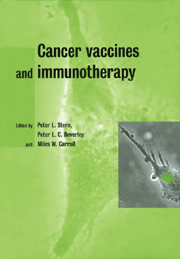Book contents
- Frontmatter
- Contents
- List of contributors
- 1 Immunity and cancer
- 2 Immunotherapy of bladder cancer
- 3 Poxviruses as vectors for cancer immunotherapy
- 4 Vaccinia-based human papillomavirus vaccines in cervical cancer
- 5 Vaccine delivery and immunosuppression in cervical cancer
- 6 Vaccines for colon cancer
- 7 MUC1 vaccines and breast cancer
- 8 Anti-idiotypic vaccination
- 9 Immunotherapy and vaccination against Epstein–Barr virus-associated cancer
- 10 Serologically identified tumour antigens as cancer vaccines
- 11 CTL-defined cancer vaccines in melanoma and other epithelial cancers
- 12 DNA vaccines against B-cell tumours
- 13 Dendritic cell approaches to immunotherapy
- 14 Overview
- 15 Recent developments
- Index
6 - Vaccines for colon cancer
Published online by Cambridge University Press: 06 January 2010
- Frontmatter
- Contents
- List of contributors
- 1 Immunity and cancer
- 2 Immunotherapy of bladder cancer
- 3 Poxviruses as vectors for cancer immunotherapy
- 4 Vaccinia-based human papillomavirus vaccines in cervical cancer
- 5 Vaccine delivery and immunosuppression in cervical cancer
- 6 Vaccines for colon cancer
- 7 MUC1 vaccines and breast cancer
- 8 Anti-idiotypic vaccination
- 9 Immunotherapy and vaccination against Epstein–Barr virus-associated cancer
- 10 Serologically identified tumour antigens as cancer vaccines
- 11 CTL-defined cancer vaccines in melanoma and other epithelial cancers
- 12 DNA vaccines against B-cell tumours
- 13 Dendritic cell approaches to immunotherapy
- 14 Overview
- 15 Recent developments
- Index
Summary
Introduction
The realistic prospect of developing a vaccine for the treatment or prevention of colon cancer derives from recent advances in molecular biology and a better understanding of the host–tumour immune response. Although the concept of vaccination is not new, the concept that T-cell responses are critical to achieving tumour rejection, coupled with the identification of novel tumour antigens that contain T-cell-specific epitopes, has led to new strategies in the application of tumour vaccines.
Colon cancer
Cancer of the colon or rectum is one of the most common neoplasms in the Western world. The highest incidence is reported in the United States, but rates are especially high in Australia, New Zealand and areas of northern and western Europe. Estimates suggest that over 131000 new cases are diagnosed annually in the United States and that about 5% of the population will develop colorectal cancer before the age of 75 years. When diagnosed in its earliest stages colorectal cancer is highly curable with surgical treatment. However, once the disease has spread to regional lymph nodes or elsewhere, the cure rates decrease dramatically. Mortality from advanced disease has remained largely unchanged over the last 50 years with over 56000 deaths annually in the United States. Recent advances in colorectal cancer research have focused on understanding the genetic changes associated with disease progression, defining methods for earlier diagnosis, and improving therapy for advanced disease.
- Type
- Chapter
- Information
- Cancer Vaccines and Immunotherapy , pp. 107 - 134Publisher: Cambridge University PressPrint publication year: 2000
- 4
- Cited by



